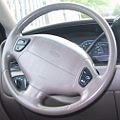2000 Ford Windstar Owner Guide 1st Printing - Page 170
2000 Ford Windstar Manual
Page 170 highlights
Driving installed, the transaxle must relearn its adaptive strategy. Optimal shifting will resume within a few hundred kilometers (miles) of operation. Your automatic overdrive transaxle provides fully automatic operation in O/D ON/OFF either (Overdrive) or with the O/D OFF switch depressed. Driving with the gearshift lever in (Overdrive) gives the best fuel economy for normal driving conditions. For manual control start in 1 (First) and then shift manually. To put your vehicle in gear, start the P R N D 2 1 engine, depress the brake pedal, then move gearshift lever out of P (Park). Once you place the gearshift lever securely into position, gradually release the brake pedal and use the accelerator as necessary. Understanding gearshift positions Your automatic transaxle electronically controls the shift feel by using an adaptive learning strategy. This feature is designed to optimize shift smoothness. It is normal for your transaxle to shift firmly during the first few hundred kilometers (miles) of operation until the adaptive strategy has been learned. The adaptive learning strategy is maintained by power from the battery. When the battery is disconnected or a new battery is installed, the transaxle must relearn its adaptive strategy. Optimal shifting will resume within a few hundred kilometers (miles) of operation. P (Park) Always come to a complete stop and set the parking brake before shifting into P (Park). Make sure the gearshift lever is securely latched in P (Park). This locks the transaxle and prevent the front wheels from rotating. Always set the parking brake fully and make sure the gearshift is latched in P (Park). Turn off the ignition whenever you leave your vehicle. 170
















